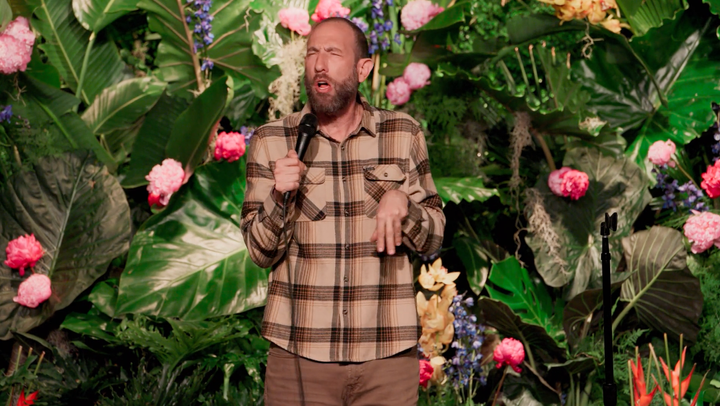A Weightless Space
On rationalizations.

In the May edition of The Atlantic, writer James Parker wrestles with his love of Theodor Capitani von Kurnatowski III, better known as Theo Von, the comedian and friend of Chris D’Elia. He’s not like the other podcasters, Parker writes: he interviews “regular people,” like a plumber and a female truck driver, and he speaks in uncharacteristically poetic language. He also seems to be racist, unfortunately, not to mention homophobic, relentlessly cruel towards homeless people, and an eager friend of extremists like Tucker Carlson and Jordan Peterson. “Goddammit,” Parker laments. “Theo’s a shill. He’s a sinister vector of reactionary bullshit. He’s a licensed fool in the court of Steve Bannon.”
Parker resolves this tension in the space of a line break. “But this, I decided, is a category error,” he concludes. “Von’s speculations exist in a weightless comedic space—and it’s kind of a Trumpy space, carnivalesque, semi-appalling, in poor taste, but that’s just where we’re at right now. The joke has hollowed us out.” Isn’t that convenient? He’s not a sinister vector of reactionary bullshit because his words are weightless—just like, uh, Donald Trump’s.
As I wrote almost three years ago, the most convincing evidence of comedy’s power to influence people is the insistence by people like Parker it has no such power. He doesn’t even bother to explain what he means by “weightless comedic space” or “that’s just where we’re at right now.” Is the idea that Von’s audience doesn’t take him seriously because he’s a comedian? That Von himself doesn’t mean anything he says? That in a world where figures like Carlson are regular features on the comedy podcast circuit and comedians are all too comfortable with bigotry, we have no choice but to conclude that these things pose no threat to the liberal order, because otherwise we might have to acknowledge our own complicity in that threat? Who can say. The joke has hollowed us out.

There’s an interesting rhetorical creep happening here. These are the sorts of rationalizations we’re accustomed to people making about transgressive jokes. In that context they’re often perfectly reasonable: jokes do exist in a different discursive space than normal speech, with their meaning hiding behind layers of exaggeration, irony, caricature, and/or misdirection. Podcasts, however, are not crafted through a process of careful artistic decision-making. They are normal conversations, combining spontaneous riffs and earnest chitchat. This is their whole appeal. It’s why people listen to them and develop such loyalty towards the people who make them. They present the comedian’s true self, free of pretense. When Von praises RFK Jr. and Tucker Carlson, he’s not in character. When he lends them his platform, his status as a comedian does not somehow carry over to them, rendering their own speech devoid of content. What happens in a comedy podcast happens in real life.
I think it’s kind of fascinating, the psychological power of funniness. People really don’t want to admit that someone who makes them laugh might actually be bad. I’m reminded of the trendy opinion among liberal-left commentators that Shane Gillis is secretly one of them, despite his long-established admiration of Donald Trump, whose return to the White House he yearned for in a recent Patreon-exclusive episode. (Also there’s the whole racism, antisemitism, homophobia, and transphobia thing.) In both cases, the defense of comedy is a perversely anti-comedy argument: that words have no power, and that comedians do not mean what they say.
While they’re certainly prone to deflection in times of controversy, I suspect most comedians in Von’s position are perfectly conscious of their own influence. In Andrew Schulz’s latest conversation with Joe Rogan, for instance, the two take a break from spouting anti-vaccine propaganda to consider their own power over young people. “Enough young kids listen to podcasts, which really bothers people—that they’re getting information from people like us,” Rogan says.
SCHULZ: Well, they have to!
ROGAN: People like us don’t have to lie. We have zero incentive to lie.
SCHULZ: Yeah. Yeah.
ROGAN: And when we’re talking about these things, like, this is what I know. These are the facts. This is real. You’re being fucked. You’re being lied to. And it’s not like there’s not a motivation. Look at the amount of money they’re making by fucking you. I mean, it’s an insane sum of money that’s involved in a lot of these decisions. And these decisions roll on whether we complain or not. But at least it kind of puts things in check.
SCHULZ: Maybe that’s the solution. Just show how much money people are making. Show how much money CNN makes from the pharmaceutical industry. And then you'll look at every story about pharmaceuticals through that lens. That’s it.
ROGAN: “Brought to you by Pfizer: Anderson Cooper.” They do it right to your face. “Brought to you by Pfizer.”
SCHULZ: “The vaccines are perfect. Let’s go to a commercial.”
ROGAN: “Brought to you by Pfizer: you will not get this virus, you will not transmit this virus. The virus stops with you.” And no one complains.
SCHULZ: Now, do you think that the people that are disseminating this information are aware of this bullshit or they are the useful idiots?
ROGAN: I think at certain point in time they must be aware.
SCHULZ: And if they’re aware they’re evil—
ROGAN: They’re trapped. They’re trapped. Because I think initially most people did think that the vaccines were gonna work.
SCHULZ: And it doesn't have to be vaccines. It can be anything. But once you're pushing out information that you know to be false, and you’re potentially hurting people—it doesn’t have to be vaccines. It could be anything.
ROGAN: Right. Now you’re evil.
SCHULZ: That’s evil.
ROGAN: That’s evil.
It’s an interesting sentiment from two wealthy men with only a fleeting interest in truth and an enduring fascination with proven liars. Schulz hosted Alex Jones on his podcast twice in 2021; last year he sat down with antisemite Patrick Bet-David for a conversation about George Soros’ noxious globalist designs on American society. Just last month Rogan had dinner with Tucker Carlson before bringing him to the Comedy Mothership, his Austin club, for a guest spot on Kill Tony.
SEE IT - Tucker's famous laugh: @TuckerCarlson and @joerogan join @KILLTONY on stage. WATCH pic.twitter.com/WVOVkwPUNj
— Simon Ateba (@simonateba) April 9, 2024
Perhaps an explanation for their inconsistent attitude towards moneyed propagandists can be found in an episode of Flagrant released earlier this month, in which Schulz criticizes Ben Shapiro for firing Candace Owens over her antisemitic remarks. “To me that is blatant bias and hypocrisy, and he's made a career calling people out for being blatantly biased and hypocritical,” he says. “If you wanna have no standards to uphold, be a comedian. Do you know what I mean? Just be a clown like us.”
Morality for thee, but not for me. It sure is helpful when they say it out loud.
What Else?
-If you're in NYC, I highly recommend Chloe Radcliffe's solo show CHEAT, playing at Union Hall this coming Thursday.
-I enjoyed Anthony Jeselnik's roast of Steven Crowder on his podcast this week (treat yourself to the comments on that post, too).
-The Humorism Book Review gives five stars to Alexandra Tanner's Worry, out now. I also loved Tanner's interview in BOMB, and also her interview in LitHub.


